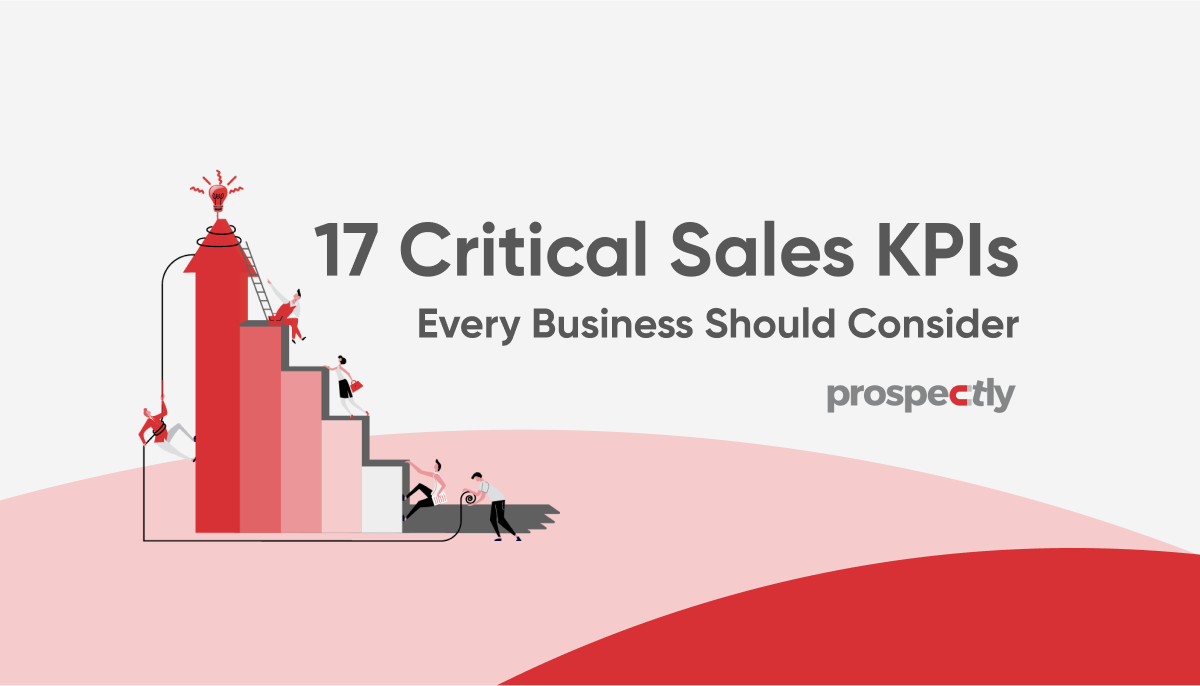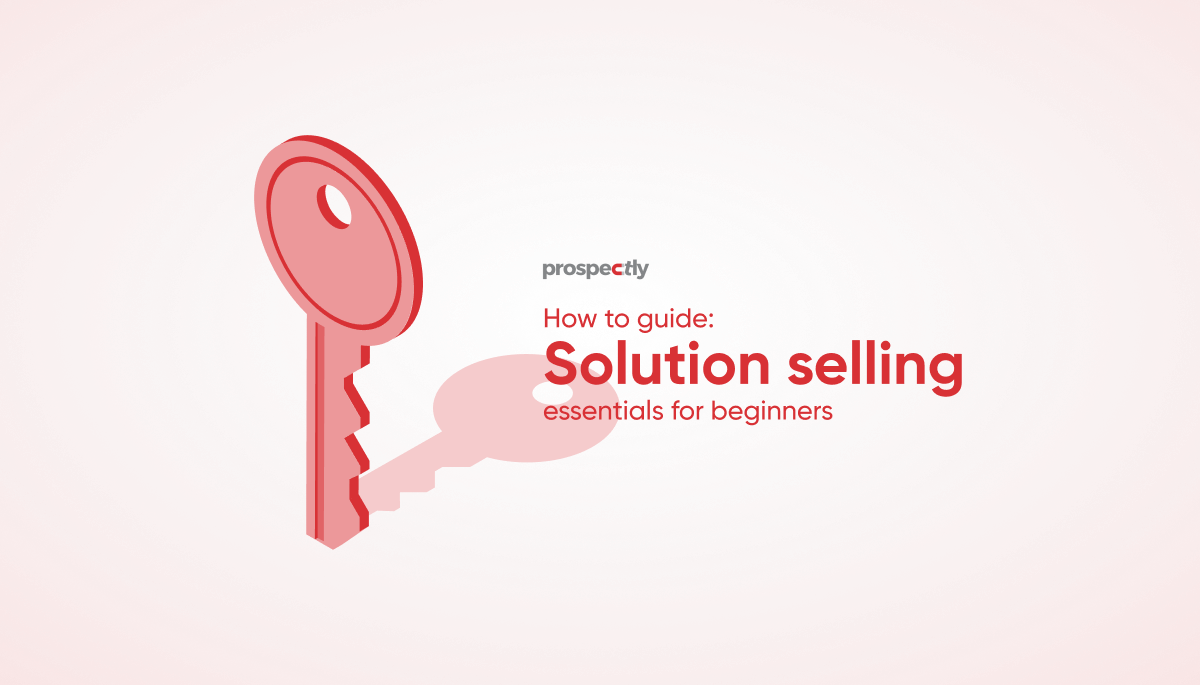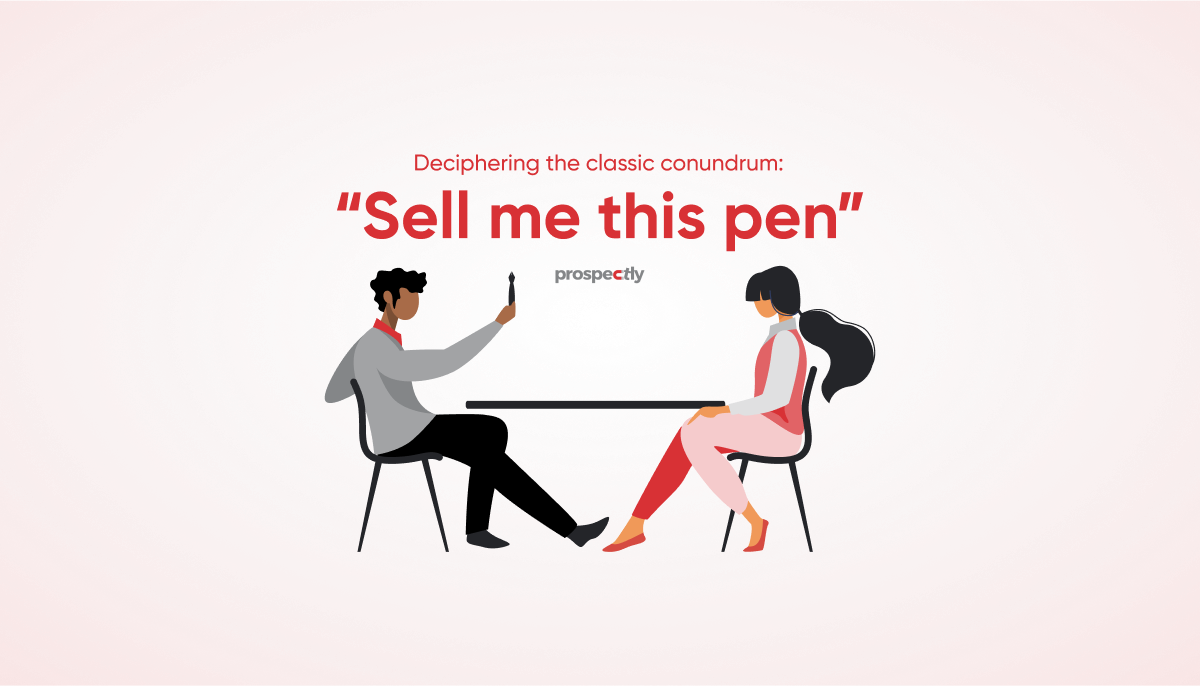Ace your next sales interview with these top 40 interview questions and answers

Irrespective of your chosen vocation, most job interviews need you to be adept at selling/promoting your skills. But when it comes to cracking a sales interview, the stakes are even higher. To land your dream job in sales, you need to bring your A-game. In addition to your natural flair for persuasion and outstanding people skills, solid preparation will increase your chances exponentially.
The techniques outlined in this blog will help you crack your next sales interview – whether you are looking to kick-start your sales career or land that coveted position.
How to prepare for your sales interview?
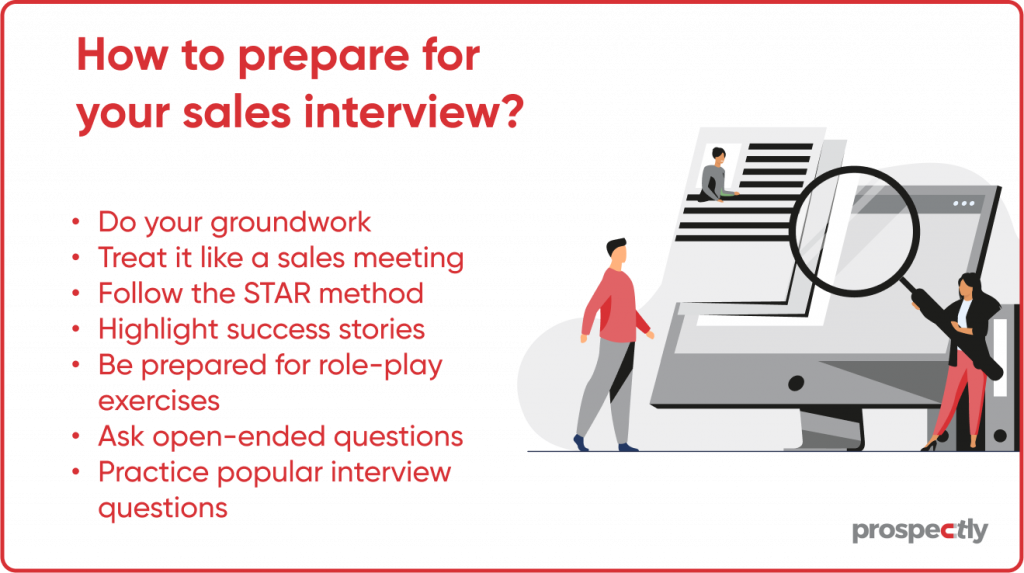
Do your groundwork
Sales is one of the few professions which requires you to know your prospective employer almost as well as they do. This is mostly because prospect research is a key part of your job. In addition, as a sales professional, you are expected to be well-versed with your prospect company’s industry and market dynamics. So before you attempt that interview, study the company you are interviewing for, know what they sell and who they sell to, and practice your approach to selling their offerings.
Treat it like a sales meeting
The most fitting way to approach your sales interview is to consider it a high-priority sales meeting. You are interviewing for a critical role which is the company’s pain point. By connecting with your interviewer and skillfully addressing their questions, you overcome any objections and convince them that you are the best person for this role. Finally, you negotiate basic details like compensation, bonus, perks, etc., and close the deal by accepting the offer.
Answer behavioral questions with the STAR method
Many sales interviews include behavioral questions that aim to evaluate how you handle various sales various scenarios. STAR (Situation – Task – Action – Result) is an effective method to approach behavioral-style interviews. It encourages you to explain to the interviewer the Situation you were in, the Task you were allocated, the Action you undertook, and the Result of that maneuver. Applying this framework will help you demonstrate your knowledge, skills, and experience during the interview.
The following example demonstrates how you can answer behavioral questions with the STAR method.
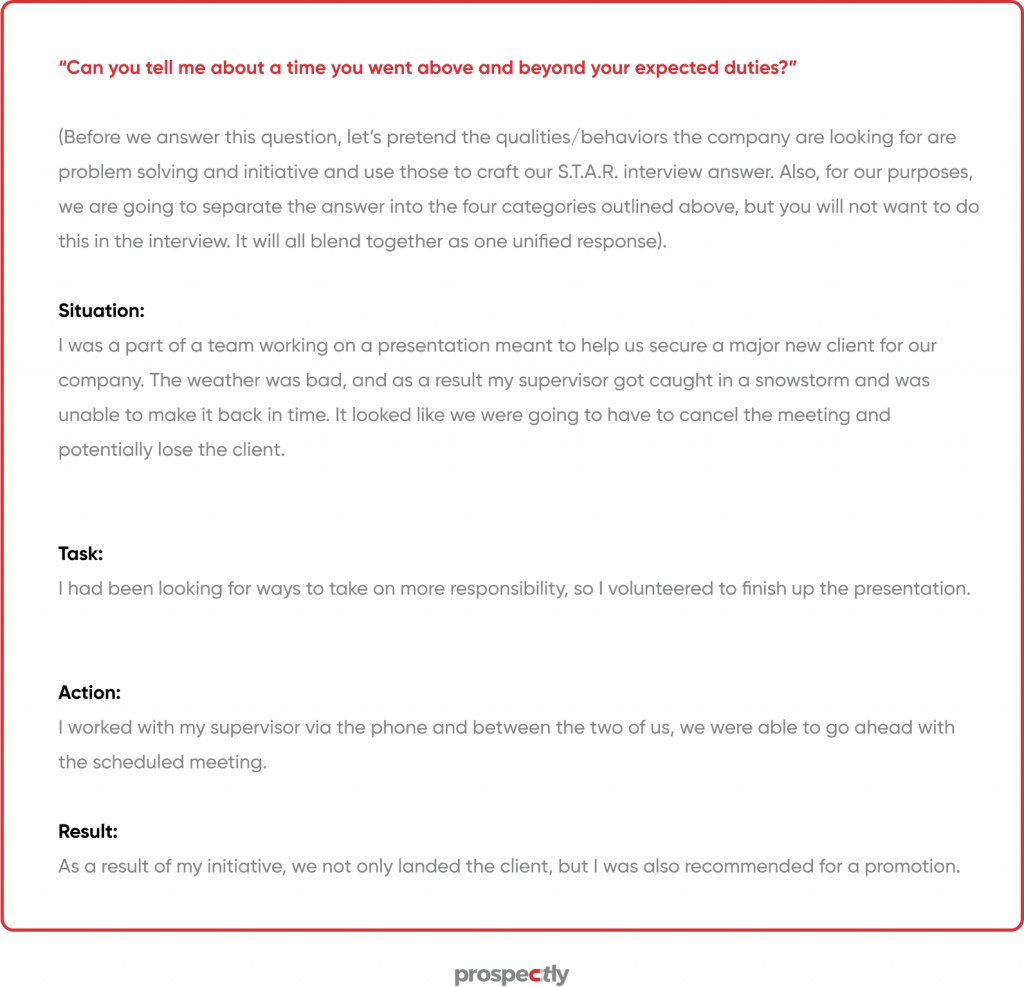
Highlight success stories
Illustrating your sales success stories can help you build credibility in interviews. Arming yourself with a few case studies with relevant figures is a great way to answer performance-related questions. You could also carry a contact book with your client list, which highlights relationships you built throughout your sales career.
Be prepared for role-play exercises
Some interviewers might test your skills via sales role-play exercises. You can practice such scenarios before the interview with a friend or trusted colleague.
Demonstrate interest with open-ended questions
A skilled salesperson is aware of the value they bring to the table. Hence they would use the interview as an opportunity to gauge the employer brand and understand the benefits they offer to ideal candidates. You demonstrate your interest in the position by asking open-ended questions whilst preparing yourself for the new role.
Here are a few questions to start with.
- Tell me more about your sales team’s size and structure?
- How would you describe your sales process?
- What would be the targets for this position?
- Can you give me an idea of your commission structure?
- What are the common qualities of your top performers?
- What percentage of your salespeople achieve their quotas?
- Do your sales teams have the flexibility to negotiate on pricing?
- What are the initial challenges for new sales hires in your company?
- What are the common objections faced by your sales team?
- Can you give me an idea of your business trajectory for the coming year/s?
- I would love to know more about your tech stack.
Get acquainted with popular sales questions
Lastly, preparing for common sales interview questions is paramount for landing your dream job. It gives you the confidence to face any possible outcome and also highlights your sales readiness to prospective employers.
The ensuing sections will focus on some of the top sales interview questions, the reasons why they are asked, and effective ways to address them. Read on.
Common sales interview questions
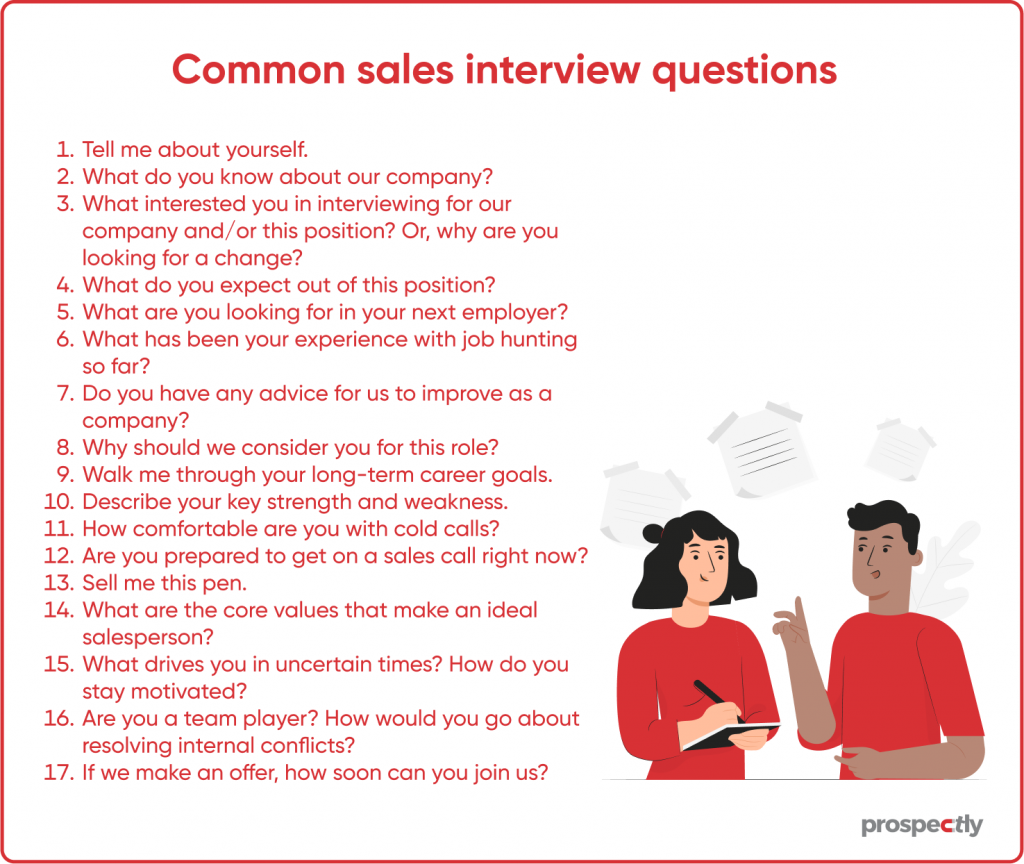
Here are a few questions that you may face irrespective of your tenure or the position you are interviewing for.
1. Tell me about yourself.
Logic: Employers want to know you professionally as well as personally.
Response: Use your rapport-building skills and offer just the right balance of personal and professional information. Start with something interesting about yourself- a hobby, passion, etc. Then build the conversation around your interest in sales and that particular company.
Example: “Well, off the clock, I am deeply in love with my X hobby; I’ve done it for years and enjoy it with my friends and family! And professionally, I’ve been a salesperson for Y years as I have a passion for Z, which led me to find your company that aligns with my interests.”
2. What do you know about our company?
Logic: The interviewer tests your research skills and interest in the position.
Response: As indicated earlier, before appearing for a sales interview, read up on your prospect company. Go through their website and their social media pages and try to figure out their ICP. You can find company reviews on Google, Glassdoor, Capterra, Yelp, or G2. It is also advisable to connect with senior management or key professionals on LinkedIn.
Example: “I have actually been following your company for some time. I love the fact that you focus on addressing X challenge. I see that you achieved Y in an impeccable timeframe. I strongly relate to your cause as [insert your reasons that show common interests].”
3. What interested you in interviewing for our company and/or this position? Or, why are you looking for a change?
Logic: Another way to gauge your research skills and test your enthusiasm to join them.
Response: State how you relate to the company’s mission and your interest in the industry/domain.
Example: Similar to the second point.
4. What do you expect out of this position?
Logic: They want to know if you are prepared for the job and if you have clarity on your goals as a sales professional.
Response: Demonstrate your understanding of the job description, along with your expectations from this new position.
Example: “I hope to build sustainable relationships with prospects and consistently meet my quota. I plan to achieve this by [insert tasks you are expected to do]. I also plan to be one of the top performers in my team and reach [enter milestone] in [enter time].
5. What are you looking for in your next employer?
Logic: The interviewer is curious about your intentions- are you really motivated to find your next best employer, or are you just testing the waters? Some of them may ask this as they aim to meet your expectations since happy and driven employees stay longer.
Response: Explain the values and offerings you expect from your next employer. Even if it does not match the company’s mission, being transparent now will benefit both of you in the long run.
Example: “What’s most important for me is not becoming complacent in my career. I am inspired by continuous learning and newer challenges. I am looking forward to contributing to a team that believes in creating utility and upskilling. I do not shy away from hard work that contributes to my overall career growth.”
6. What has been your experience with job hunting so far?
Logic: You face this question when an employer wants to know your possible joining timeframe and if you are considering other offers.
Response: Your aim while job hunting is to look for the best possible option and have a safety net without misleading employers.
Example: “ I have interviewed for X, Y and Z companies so far and waiting to hear from them on the final offer.”
7. Do you have any advice for us to improve as a company?
Logic: This again can be to test your interview preparation or a genuine interest in your opinion.
Response: Based on your knowledge of the company, imagine you own the company and what you could do to make it better. Be mindful of offering only constructive feedback, so your advice does not sound offensive.
Example: “ I am really impressed by your consistent social media efforts to engage with your primary audience. However, I feel like you are missing out on the Gen Zs, and you could tailor some content for this particular demographic.”
8. Why should we consider you for this role?
Logic: The interviewer wants to know if you are confident enough to deliver on their expectations.
Response: Clarify your doubts if you did not get enough meat about the JD from your initial communications. Then draft your answer accordingly, provided you actually intend to /can meet their needs. Know your USP and communicate the same as precisely as possible.
Example: “ I understand you are looking for someone from X industry. My experience is a mix of X and several other sectors. My exposure to diverse business segments has enriched my client handling skills, which would be a great add-on for your team. ”
9. Walk me through your long-term career goals.
Logic: Employers know that you are here for the long haul if you are driven enough to set long-term goals.
Response: Before the interview, get in touch with a senior sales professional you admire or a sales mentor. Pick their brains to see how they reached where they are. Take diligent notes, create your goals, and list the activities you need to execute to reach those milestones. Narrate them in detail and with confidence.
Example: “ Along with meeting my assigned quotas, I want to get comfortable with handling Fortune accounts by next year. I also want to hone my leadership skills and would like to take up some related courses, or gain experience by mentoring juniors at work. This will help me achieve my long-term goal of holding a directorial position in X years and ultimately move on to a C-level role in Y years.”
10. Describe your key strength and weakness.
Logic: This shows your self-awareness to know what you excel at and which aspects need improvement.
Response: Do not hesitate to sell your strengths in the interview. But, while highlighting your weaknesses, add what you are doing to improve yourself without compromising your chances.
Example: “My greatest strength is my competitiveness, which is why I also excelled as an athlete in high school and college. Nothing invigorates me like a race to the finish; I love the challenge of trying to consistently earn an annual ranking in a company’s President’s Circle. I’ve learned, though, that no one becomes a top achiever without the help of the rest of the team. My weakness is that I’ve sometimes judged other team members when we’ve fallen short of a goal, so now I try to focus on motivating and supporting my team rather than just expecting them to follow my lead.”
11. How comfortable are you with cold calls?
Logic: For a fresh college graduate, the interviewer wants to know if they are outgoing enough to break the ice with strangers. It is equally important for experienced sales professionals to have had exposure to cold calling as it hones your relationship-building skills.
Response: Depending on your experience level, you either let them know about your ability to strike up a conversation or sell to strangers. Or you recount your experience and strategy for cold calling.
Example: “As daunting as it can be, I understand that cold calling is the stepping stone for success in sales. I have always been an outgoing person and good at making friends out of strangers. I am excited to begin my cold calling journey based on solid prospect and industry research.”
12. Are you prepared to get on a sales call right now?
Logic: This can be subjective. They are either testing your confidence or want to know if you think before speaking.
Response: Show them your ability to think on your feet. Also, explain that you believe in solid preparation before representing a company.
Example: “I have a repeatable sales process that I can mold to your product right away. Once I learn enough to be a responsible salesperson, absolutely, I’ll be ready for a call.”
13. Sell me this pen.
Logic: Be it an apple, a pen, or any other product, this is a classic sales interview question that tests your sales skills.
Response: Once again, preparation is key to answering this question. While there are various ways to answer this question, here’s one from The Balance Careers.
Example: “Even in our tech-focused world, a pen is still essential. What I like about this one is that it has a secure cap, so it won’t stain pocket interiors or a bag. Plus, it’s refined-looking yet still budget-friendly.”
14. What are the core values that make an ideal salesperson?
Logic: They want to know if you have what it takes to be in this profession.
Response: Draw on your past experience, read up on the essential sales skills and decide what, according to you, are the most important ones to have.
Example: “These are some of the essential skills which I feel are non-negotiable in sales. Empathy, Objection handling, [insert others].”
15. What drives you in uncertain times? How do you stay motivated?
Logic: The interviewer is trying to figure out what keeps you going, probably beyond monetary benefits.
Response: A smart way to answer this would be to align your motivation with the company’s mission which may be to serve a higher purpose.
Example: “I have always wanted my work to leave a positive impact on society. I really appreciate how your company has helped address [enter a fundamental issue]. This is something that could keep me motivated even during a low sales period”
Also read: The complete guide to understanding sales motivation
16. Are you a team player? How would you go about resolving internal conflicts?
Logic: Your prospective employer is not only looking for a sales star but also a team player who can uplift others.
Response: Share why you value teamwork, how it helps you succeed, and if possible, some examples from your past (school or work) where you shone as a team player.
Example: “I really believe that it takes a village to achieve your and your team’s targets in sales. I have had great success in the past because of my inherent team-building skills. There’s this one time when [insert your story and how you delivered exceptional results with team effort].”
17. If we make an offer, how soon can you join us?
Logic: It’s a sign that you are interviewing for a high-priority role, and they want you to join as soon as possible. They might also want to know how serious you are about joining them.
Response: Be honest about your options and any notice period that needs to be served at your present employer.
Example: “Once I have an offer, I am required to serve a notice for [insert time] at my current employer. There may be an option to do without it, but I am hoping for a smooth transition and not leave my team in a bind. I hope that is okay with you, as I am really interested in joining your team.”
How to land a sales job without any prior experience?
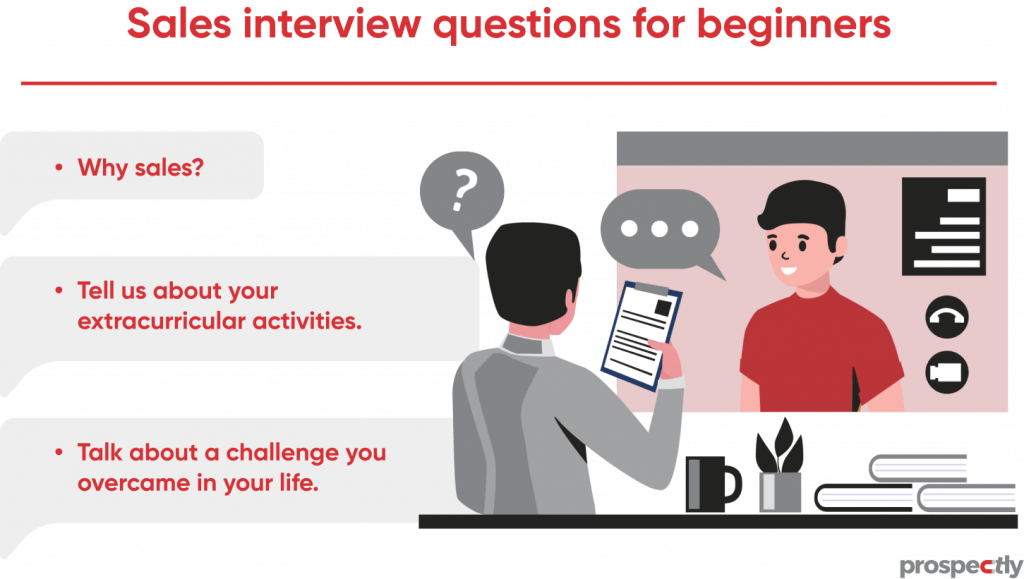
It is only natural to worry about attempting a sales interview if you lack experience. However, do note that sales is one of the few industries that hire the most freshers. It’s because companies want fresh minds to mold into future sales superstars. Additionally, since the compensation is performance-based, they get away with salary negotiations.
Here are some example questions that you can tackle with limited or no sales experience.
1. Why sales?
Logic: They want to know your ‘why’ to predict your chances if sticking to the profession.
Response: Demonstrate how your life experience or educational background has prepared you for sales.
Example: “I’ve always been a very competitive person and love a good challenge. Even early on, in my schooling days, I would compete in all academic programs (like speech and debate). I loved the process of researching, preparing, and the thrill of competing for the #1 spot.
I believe I’ll thrive in a fast-paced tech sales role and be motivated to hit my numbers and ultimately make bigger commission checks.”
2. Tell us about your extracurricular activities.
Logic: The interviewer wants to know if you have previous experience in competing or taking up a challenge.
Response: Show your competitive side and love for winning by taking about a sport you played or associations you were a part of. Or you could also talk about transferable skills that you acquired in your previous job.
Example: “I understand my earlier work experience was in IT, and sales is a completely new domain. However, your company sells tech products, and I believe someone with prior experience in this industry would be a great asset to your sales team.
Moreover, I played competitive [insert sport] in school, which gives me the drive for success.”
3. Talk about a challenge you overcame in your life.
Logic: They want to test your endurance for facing obstacles/failures and the ability to learn from your mistakes.
Response: Talk about a time when you faced a challenge and stretched yourself mentally or physically to overcome it.
Example: “Growing up, I have always been a fan of [insert a sport] and saw myself competing in college. Even though I achieved that dream, sports did not come naturally to me. [Insert how you overcame that challenge].”
Popular sales interview questions for experienced candidates
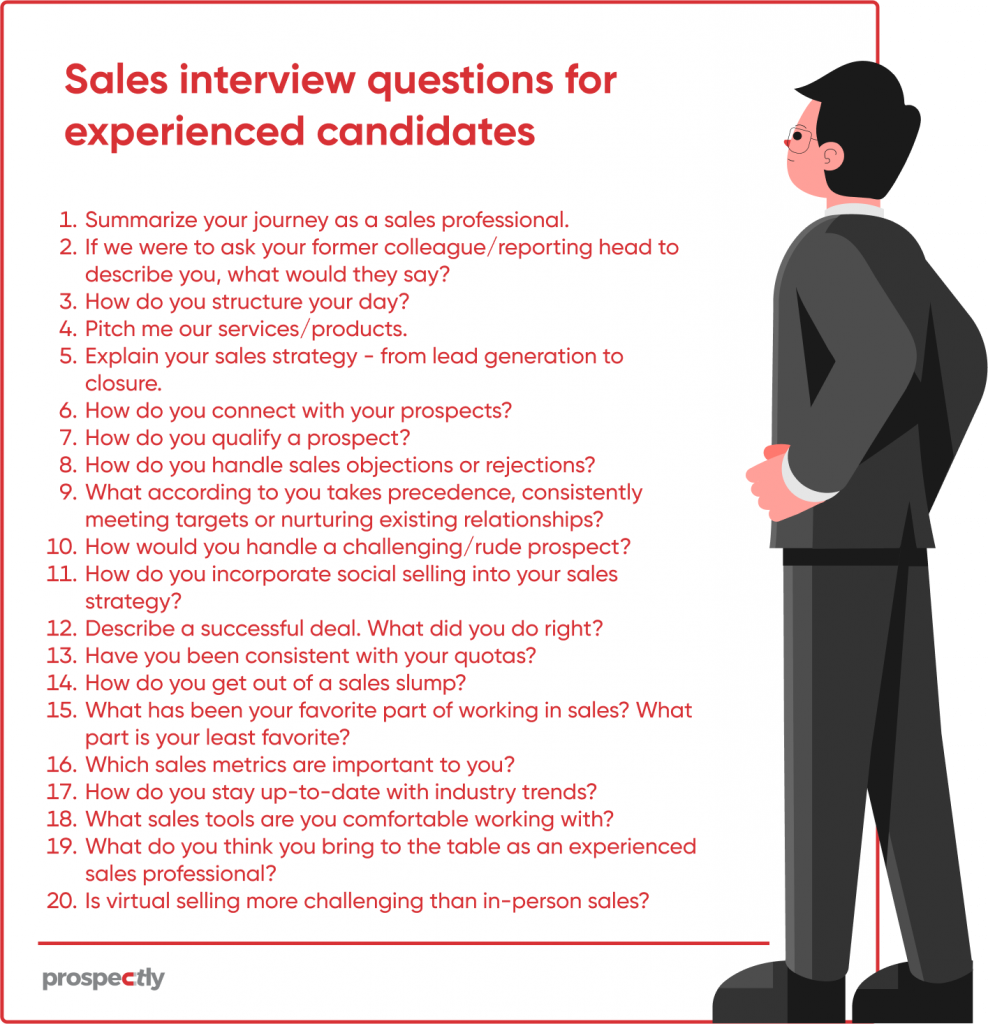
The following sales interview questions are generally set to test your sales skills based on your experience.
1. Summarize your journey as a sales professional.
Logic: The interviewer wants to get an overview of your sales career.
Response: You can start with your first sales job and describe your learnings from each profile.
Example: “I started with X industry with company A. After spending a couple of years in this sector in two other companies, I felt I would do great in Y industry as it relates to my experience as well as passion. That is why this opportunity is ideal for me in many ways… [Insert your reasons].”
2. If we were to ask your former colleague/reporting head to describe you, what would they say?
Logic: It is important for your prospective employer to understand your self-perception so they can compare notes when they conduct reference checks.
Response: To answer this question, you should have a fair idea of what your manager or colleagues think of you. Go back to any appreciation email or a time when you were complimented at work.
Example: “My colleagues know of me as someone who is dependable and thinks of the bigger picture. I once received a certificate of appreciation for going above and beyond my duties for this one project where [insert project details].”
3. How do you structure your day?
Logic: Your interviewer wants to know if you are able to cope with the everyday work pressures and organize your day for optimum productivity.
Response: Let them know that you have a plan of action to take on your workday. Instead of dealing with work issues as they come, tell them how you organize various tasks logically in different time buckets to get the most out of your day.
Example: “Well, I usually like to start my day with a few cold calls as I am more energetic during the early hours, and also those are the active calling hours. Post lunch, I catch up with all operational tasks. [Insert the rest of your schedule].”
4. Pitch me our services/products.
Logic: This is a classic example of a role-playing exercise wherein your interviewer wants a demo of your sales and research skills.
Response: Instead of jumping into your prepared pitch, start with a few knowledge fact-gathering questions to understand the prospect’s (interviewer’s ) requirement and pain point. Demonstrate your research and sale skills by customizing your solution.
Example: “From my research/ from what I just heard from you, I understand you are doing quite well in X sector but could do even better with faster delivery and a more customer-centric approach. Here’s where we shine. [Insert your product/service].”
5. Explain your sales strategy – from lead generation to closure.
Logic: This is an important question for your interviewer as a major part of your success depends on your sales acumen.
Response: Take them through your entire process from start to finish.
Example: “I begin to generate sales opportunities by X through calculated preparation and client targeting. I develop opportunities by listening to the needs of the customer and working on providing the most appropriate resolution. I close sales opportunities by gaining the customer’s trust in both the product and me until we reach a positive agreement.”
6. How do you connect with your prospects?
Logic: The interviewer wants to know your rapport-building strategy.
Response: Explain your personal approach to building customer relationships.
Example: “Every customer is different, so to ensure that I can build relationships with them, I would personalize my approach to their unique needs and hold conversations that are inviting and appropriate as we conduct business.”
7. How do you qualify a prospect?
Logic: They want to know your strategy behind prospect qualification, as it saves the company time and money to focus on winning accounts.
Response: Explain your prospect qualification strategy in detail. For cues to answer this question, refer to our blog on Sandler sales methodology that focuses on finding the right prospects for your product/services than the other way around.
Example: “I believe in qualifying prospects early in the sales cycle, by asking the right questions. If I feel the prospect won’t benefit from what I offer, I will move it off my list. This saves me a lot of time chasing dead ends and I get to focus on prospects that are actually interested in our product.”
8. How do you handle sales objections or rejections?
Logic: Your interviewer wants to know if you are well-equipped to handle any objection that comes your way.
Response: Explain to them how you prepare to face sales objections-wether it is research, reaching out to other teams like product or marketing, or seeking advice from your reporting head.
Example: “I believe preparation is key for handling objections. Before any call, I research the prospect company and try to come up with possible challenges I may face during the call. [Insert more pointers].”
Related: 22 Most daunting sales objections and how to overcome them
9. What according to you takes precedence, consistently meeting targets or nurturing existing relationships?
Logic: They want to know how well you know their business and target market.
Response: Frame your answer based on the company profile. For eg, if they sell one-off investments, they would value new customers. If they offer subscription-based services, the majority of their business might come from existing clients.
Example: “Generally, both customer types are equally important for the company’s growth. But as you have built a loyal customer base from your quality offerings and you sell membership subscriptions for X, you should focus more on keeping your existing clients happy whilst maintaining a healthy focus on acquiring new customers.”
10. How would you handle a challenging/rude prospect?
Logic: They want to know if you are capable of handling angry or frustrated prospects as such scenarios are quite common in sales.
Response: Demonstrate your ability to win over any personality type by being empathetic, logical, and assertive.
Example: “There have been times when prospect conversation during negotiations has become challenging. While I want to meet my quota, but if winning the deal is not mutually beneficial, I would have to request them to look for other options.”
11. How do you incorporate social selling into your sales strategy?
Logic: Employers want to get a read on your virtual selling skills, which is crucial to a company’s success in today’s virtually connected world.
Response: Let them know your comfort level with using social media in attracting prospects and nurturing your target market. You can give an example where you closed a deal because of your engagement in social media.
Example: “Social selling has become an important part of my sales efforts, especially since Covid 19 enforced virtual selling. In fact, last month I secured a big account because of my continued efforts to engage my customers online. [Insert what you did and how you helped your target market]”
Pro tip: Read The “whats”, “whys”, and “hows” of social selling
12. Describe a successful deal. What did you do right?
Logic: They want to know your strategy behind closing your greatest deal.
Response: Give them a step-by-step description of your most successful deal. It should highlight what you did differently.
Example: “My biggest sale (so far) involves selling a five-year contract for XYZ’s enterprise software to ABC Automotives. Believe it or not, this deal started with a cold call; in that initial conversation, the customer shared a problem that the enterprise software could solve, and so I was able to target subsequent presentations and interactions in a solution-oriented way. Relationship building was key to closing this deal, as well as to providing targeted demos of the software that spoke to saving the client time and increasing productivity.]”
13. Have you been consistent with your quotas?
Logic: Your interviewer wants to know your track record to predict your future performance at their company.
Response: Be honest and showcase your wins. Even if you did not have many of those, demonstrate how you improved from your failures.
Example: “Before covid, I won the best salesperson title in my company every quarter. The introduction of virtual selling threw me off my game for a little bit and I went through a lull. But I have always been a fast learner, I adopted virtual selling techniques and upped my social selling game. I have been able to pick up the pace since last year.”
14. How do you get out of a sales slump?
Logic: They want to know if you have the resilience to pick yourself up and get back in the game after a prolonged slow sales period.
Response: Explain your strategy- how you track your progress and what measures you take to get back to the groove.
Example: “When sales go down, I don’t panic. Instead, I take a step back and make a strategic plan to reach more customers, with a different approach. I would calculate how far I am from my benchmark and re-evaluate my plan as needed.”
15. What has been your favorite part of working in sales? What part is your least favorite?
Logic: This question gives them a sense of your strengths and areas where you will need additional support.
Response: Be honest about what you like best. While highlighting your not-so-favorite part, describe your steps to make that part easier.
Example: “Well, apart from the great compensation plans, I love the thrill of winning. It gives me the endorphin rush I thrive on. The part I don’t like a lot is operations, but by using sales intelligence tools I have been able to manage such tasks.”
16. Which sales metrics are important to you?
Logic: This can be a way to judge your technical knowledge.
Response: To answer this ensure you have a clear understanding of essential sales metrics. Take a look at our comprehensive blog on critical sales metrics and prepare your answer based on the ones you feel drive the most revenue.
Example: “My previous company practiced tracking these key metrics [insert the metrics]. However, I have paid special attention to X and Y metrics because of their direct impact on my sales targets.”
17. How do you stay up-to-date with industry trends?
Logic: They want to know if you are passionate enough to follow industry news.
Response: Mention your sources and how they have helped you win customers.
Example: “I am a big fan of X, Y and Z podcasts as they talk about the most current trends in the market. Then I get my daily dose of industry news by subscribing to relevant blogs and on social media platforms like LinkedIn and Twitter.
18. What sales tools are you comfortable working with?
Logic: They need to know that you do not shy away from using technology.
Response: Mention what you have used so far, demonstrating your familiarity with using sales tools.
Example: “I have always used X CRM in my previous sales jobs. It has helped me remove mundane tasks and focus solely on my selling efforts. I am keen to explore what tools you use in your company.”
19. What do you think you bring to the table as an experienced sales professional?
Logic: This is another question that helps employers judge your greatest skills and understand if you are aware of them.
Response: Use this as an opportunity to sell the skills you gained from your experience, and highlight how that can help you in your new role.
Example: “I have worked in your industry for the past 5 years, which makes me a great candidate for this position. I have also managed small teams, which is critical for this role.”
20. Is virtual selling more challenging than in-person sales?
Logic: They want to know you if you are attuned to the realities of virtual selling.
Response: In a world of recurrent pandemics, companies have equipped themselves with the necessary tools to survive and thrive virtually. Read our blog on virtual selling for strategies to up your remote selling game. Let them know your comfort level with virtual sales and how you have been preparing yourself for this new reality.
Example: “The initial mandate to work remotely came as a shock, and it took me some time to get used to it. However, I have incorporated [insert your strategies] and now am quite comfortable should I need to transition into full virtual mode again.”
Summing up
Interviews can be unnerving, especially in the cut-throat world of sales. But through extensive research, proactiveness, preparation, and a clear vision of your goals, you can expect positive outcomes. Whether you are a beginner or a seasoned sales professional, the strategies mentioned in this comprehensive blog will give you a winning chance at your next sales interview.
